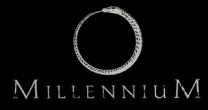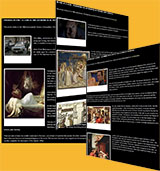Putting the ‘um’ into Millennium
As ‘The X-Files‘ so relentlessly tell us, the truth is out there, banging on the door to the next century and pointing at the hand of God. John Lyttle takes a Manichean view of BSkyB‘s latest Zeitgeist-buster.
John Lyttle - Saturday, 1 February 1997
The metaphysical serial killer smash Millennium arrived on BSkyB on a tidal wave of hard sell (so expensive ITV and Sky split the cost) and hype (so shocking it had to be transmitted at 10 o'clock) and saddled with a tag line ready to backfire: "From the makers of The X-Files". So it seemed wise to let high expectations fall to earth, especially as the series also boasted of "pushing the TV envelope" - though if "pushing the TV envelope" means showing things never before seen on the box, the boast is amply fulfilled: bodies are microwaved, lips sewn together, corpses defecated upon, walls soaked in blood. Then again, one backed further off because BSkyB seemed to be not just inviting, but virtually begging for odious comparisons by scheduling producer, wunderkind and cultural impresario Chris Carter‘s latest trawl through the shadowy recesses of the zeitgeist directly after The X-Files, hoping not only to hold on to its predecessor‘s audience share, but also to clone its offbeat, but fanatical following. A high-risk strategy. Reputations have been ruined that way.
So, nearly two months on, what do we have? Well, something shrewd, mostly nasty, not to say morally dubious, and perhaps even (if the word still holds any resonance) reactionary; a truth that flies in the face of The X-Files‘s hard-core anti-establishment raison d'etre, but nevertheless a truth that is "out there", albeit camouflaged by Chris ("I love to steal") Carter‘s strategic steals from every cool pop contemplation of, oh dear, "good v evil" of the last few years. Not to worry; what ought to play as drained and strained, instead seems triumphantly conclusive - or as conclusive as the casually post-modern gets, as if all of the new show‘s genre models were scattered pieces of a jigsaw puzzle, patiently waiting to be put together so that the public could marvel at the larger picture: The Millennium - the year 2000 and the second coming of Christ, when all the saints come marching in to rout the Beast and end the 1,000- year rule of Satan unbound.
To wit: ex-FBI Frank Black (Lance Henriksen), cursed with the talent, and torment, of seeing the world through madmen‘s eyes, is a brazen replicant of Will, the ex-FBI agent of Thomas Harris‘ thriller Red Dragon, later the Michael Mann movie, Manhunter. The pilot episode‘s gimmick of live burial hails from The Vanishing. Blue Velvet, of course, lends the ear (amputated) plus crawling insect that adorns the second programme. The casting of Terry O'Quinn as sometime sidekick conjures his mass- murdering Stepfather. The kidnapping in the third show nods to The Silence of the Lambs, which itself took its MO from Ted Bundy (the first-hand borrowing in the name of verisimilitude made the skin crawl, so imagine how a second-hand-me-down makes even the most blase voyeur feel). And then there's... Se7en.
The unlucky number behind David Fincher‘s oppressive movie masterclass in the ways and means of Old Testament retribution hangs out everywhere, and gets into everything. It lends Millennium its grungy palette - Carter quietly hired Gary Wissner, Se7en‘ art director - is strip- mined for its atmosphere (guilty, jaded, cosmically pained), and raided for its jittery, sub-Super 8 opening credits, right down to the stray, nonsensical/ meaningful words - Wait/Worry/Who Cares?. If The X-Files are chiefly pulp and mood pieces, then Millennium is a stab at a tone- poem - and insistently poetic. The series is encrusted in literary quotes, from Yeats - yes, "the centre cannot hold" - to the sundry religious verses that introduce each episode: "I have no rest, for trouble comes". With success, Carter has discovered, as many have, that swank can be married to sensationalism, and, moreover, that he has something to say - or, to be precise, lip-synch. For, above all, Se7en‘s title is taken - and taken literally. As literally as fundamentalists take the Bible, Se7en referring, of course, to the statutory complement of deadly sins. Millennium too, in its magisterial manner, knows that right is might, and who is in the wrong. Not just the killers, but those others who protest that grey is indeed the universe‘ colour scheme, those souls - see the misled, sacrificial cult members of episode three - who, in their weakness, have created the decayed conditions that grant our deepest fears flesh.
Not that our hero‘s immediate environment is dark. It‘s only his name that is Black - the single sulphurous whiff of ambiguity that Carter, the hip king of conspiracy, confusion and uncertainty, allows himself - if one discounts the casting of Henriksen himself (the rich sociopath who once hunted humans for fun in Hard Target). Otherwise, all‘s light with Black‘s world, a golden, heavenly light, a nimbus around the bluntly iconographic clapperboard home which, when not solving cases by simply having intuitive flashes (shown, aptly enough, in Manichean black and white), he shares with wife Catherine (Megan Callagher) and their darling daughter. Though a stalker may have been positioned in the wings, hearth and home offer refuge; Se7en reigns supreme here, too. Callagher, unlike Se7en‘s Gwyneth Paltrow, hasn‘t lost her head (yet), but like Paltrow, she‘s endlessly supportive of her recessive male, less mere mortal, more pure abstraction. Sheer goodness, possibly, just as the Blacks‘s daughter is Innocence Incarnate. The happy family circle is also the magic circle, the solitary safe place - a notion Millennium idealises to near-parody, despite ‘The X-Files‘ weekly warning that nowhere - no one - is "safe". Arbitrary forces are at work, and barely bothering to hide. Hence The X-Files‘s drolly accurate reflection of the suburbs and small towns as magnets for weirdness, replete with cannibals, devil- worshippers, Republicans and incestuous mutants ready to beat your brains out with baseball bats while Johnny Mathis croons "Chances Are". Millennium may be a word that evokes a fast-approaching future, but the show is always gazing longingly back to a faked Middle America that never existed, save as propaganda. Remember Ronald Regan‘s "It‘s Morning in America" re-election campaign, similarly larded with understanding wives, obedient children and the prospect of school prayers?
Millennium is ill at ease with anything, and anyone, outside those inflexible confines: God, Mom and Apple Pie. For its stunningly basic dichotomy to hold - this good, that bad - the "alien" must be expelled. The X- Files tends to love the alien, or at least to allow it a common humanity. Millennium, by contrast, presents victims who are as characterless as the killers; two sides of the same base coin. The unknowableness of the pathological mind is shared by, say, prostitutes (decapitated, but already faceless) and homosexuals - "outsiders" whom Millennium turns into outcasts. The "exceptionals" whom Mulder would communicate with, and Scully be polite to, Millennium treats as meat. So, when a police chief remarks that, in all his years on the force, he has never seen anything as terrifying as the entombed gay man with stitched-up eyes and mouth he saw tonight, Black intones, "Then you‘ve never seen your child in hospital". The fact that there‘s a difference between concussion and mutilation should be self-evident, or, at least, not weighed. Here, it is, a cruelty that even NBC‘s plodding Profiler is at pains to avoid; but then, the Profiler herself is a single woman and mother, and inured to a vulnerability (a separateness) that Millennium can only discuss in strictly forensic terms, forgetting that the deity it hunts for is supposed to love us all with equal ardour.
Not that Millennium would deign to entertain the thought. Doubt is given no houseroom here. Watching the show immediately after The X-Files is like watching a conversation between two sides of a split personality. Could it be that Chris Carter got tired of asking questions of a universe that didn‘t return his calls, so he decided to supply his own? Why not? Answers are as part and parcel of Pre-Millennium Tension as the who, what and whys, though inevitably less interesting. Questions are by their nature complex, while answers (in TV terms at least) must be simple. Answers have to leave out something, and it transpires that that something is the unavoidable mess, scrabble and compromise that we make of our lives, not knowing, as Millennium knows, that this is the door the Devil and his disciples saunter through. Millennium knows who forgot to fasten the lock, and, when you stop to think about it, so do you. It is, dear reader, the audience. It is, dear reader, most probably you.
`Millennium': Sundays 10pm BSkyB, Sky 1
© 1997 independent.co.uk






